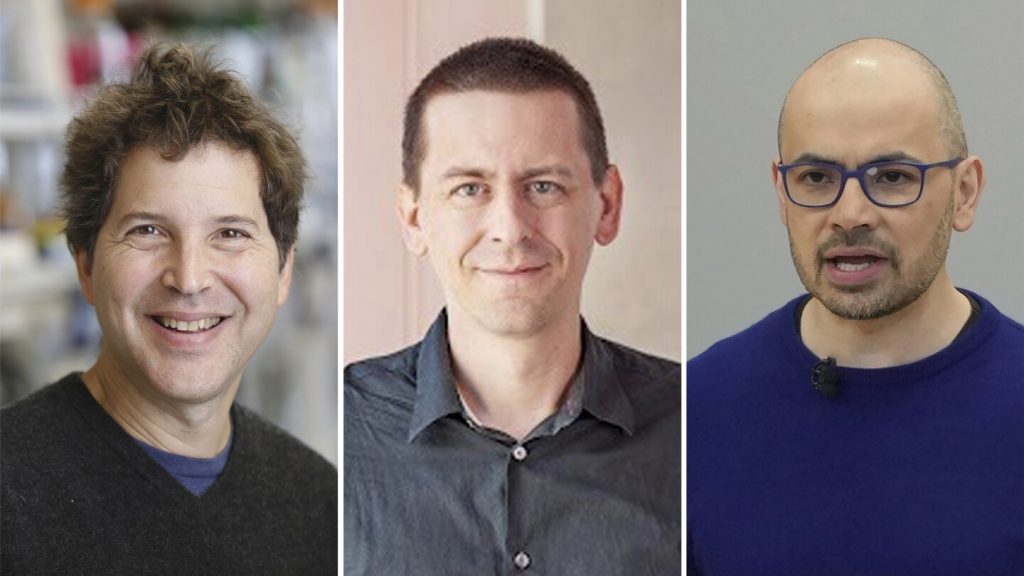On Wednesday, the Nobel Prize in Chemistry was awarded to three scientists—David Baker, Demis Hassabis, and John Jumper—for their groundbreaking work on the decoding and design of proteins, vital molecules that form the basis of all life. Their research employs advanced technologies, particularly artificial intelligence, which promises to revolutionize the methods by which new drugs and innovative materials are created. Baker, a biochemist at the University of Washington, developed a sophisticated software known as Rosetta that analyzes data from existing proteins to construct new, non-natural proteins. Meanwhile, Hassabis and Jumper, computer scientists at Google DeepMind, utilized AI to predict the structures of nearly all known proteins, thus addressing a significant challenge that has persisted in chemistry and biochemistry for decades. Heiner Linke, chair of the Nobel Committee for Chemistry, noted that their awarded research represents a crucial breakthrough in understanding complex biological machinery.
The significance of this work lies in the ability to design custom proteins and enhance the comprehension of existing ones, making it feasible to create novel vaccines and therapeutic drugs. Baker emphasized the potential to engineer smarter medicines that function appropriately in targeted areas of the body. There are practical implications already being discussed, such as a nasal spray designed to inhibit specific viral infections, including COVID-19, and treatments that could potentially mitigate cytokine storms—a dangerous inflammatory response in certain medical conditions. The merger of protein engineering and AI to predict protein structures enables scientists to design sequences that facilitate the creation of unprecedented protein structures, fundamentally transforming therapeutic approaches in medicine.
The emotional reactions of the prize winners marked a highlights of the announcement. Baker discovered his win alongside his wife early in the morning, prompting an ecstatic reaction from her. Conversely, Hassabis had a more subdued morning, initially missing the call from the Nobel committee until they finally reached his wife, who subsequently connected them. Jumper expressed his disbelief and joy, indicating the magnitude of the recognition and its associated honor. This combination of personal anecdotes illustrated not just the scientific achievement but also the human element of surprise and joy associated with such accolades.
The role of artificial intelligence in this research cannot be overstated. Founded by Hassabis, DeepMind has been instrumental in applying AI to complex problems, achieving significant breakthroughs. One such advance is AlphaFold, an AI model capable of determining protein structures rapidly—once an arduous process taking months or years, it can now be accomplished in mere seconds or minutes. The collaboration between Baker’s group and DeepMind has fostered a mutual enhancement of methodologies, with Baker recognizing the profound impact of AI on their approach to protein design. This rapid advancement suggests that AI is becoming an indispensable tool in enhancing the pace and efficiency of scientific research.
Furthermore, the growing influence of AI in scientific fields was underscored by the recent awarding of the Nobel Prize in Physics to Geoffrey Hinton and John Hopfield, both of whom have made notable contributions to AI research. Hinton, recognized as a pioneer in the field, expressed optimism about AI’s potential to revolutionize healthcare but also cautioned about the possible consequences of creating intelligent systems that might surpass human capabilities. This dual perspective highlights the delicate balance between innovation and ethical considerations in the sphere of advanced technologies.
In conclusion, the Nobel Prize in Chemistry not only honors significant accomplishments in the realm of protein design and understanding but also reflects the confluence of AI and biochemistry in contemporary scientific advancement. The recognition of Baker, Hassabis, and Jumper signifies a milestone in the ongoing journey to harness complex biological data for practical applications in medicine and environmental solutions. The prize further cements the role of a new generation of scientists who are employing AI to tackle some of the most pressing challenges facing humanity today, paving the way for future breakthroughs in the health sciences and beyond. As the Nobel Prize announcements continue with various categories, the integration of AI across disciplines underscores a transformative era in research and development.

